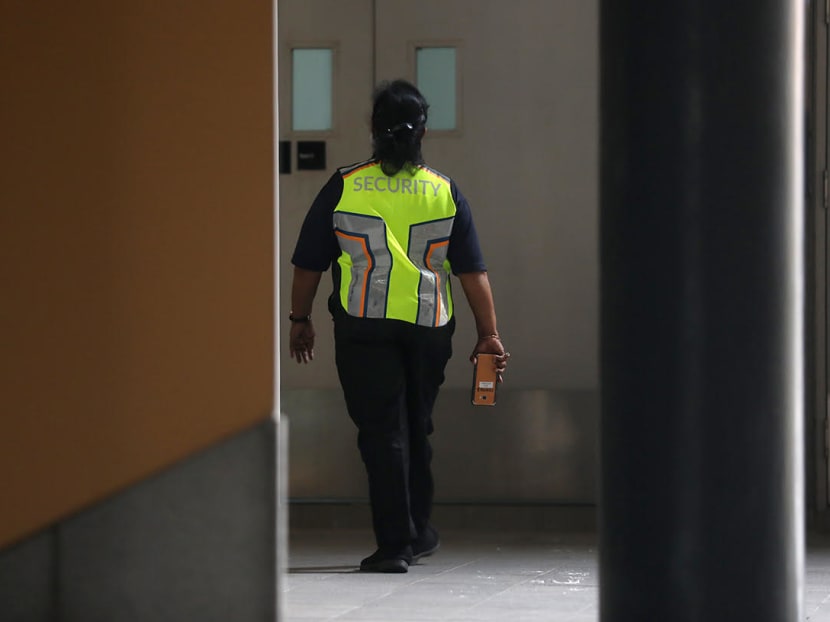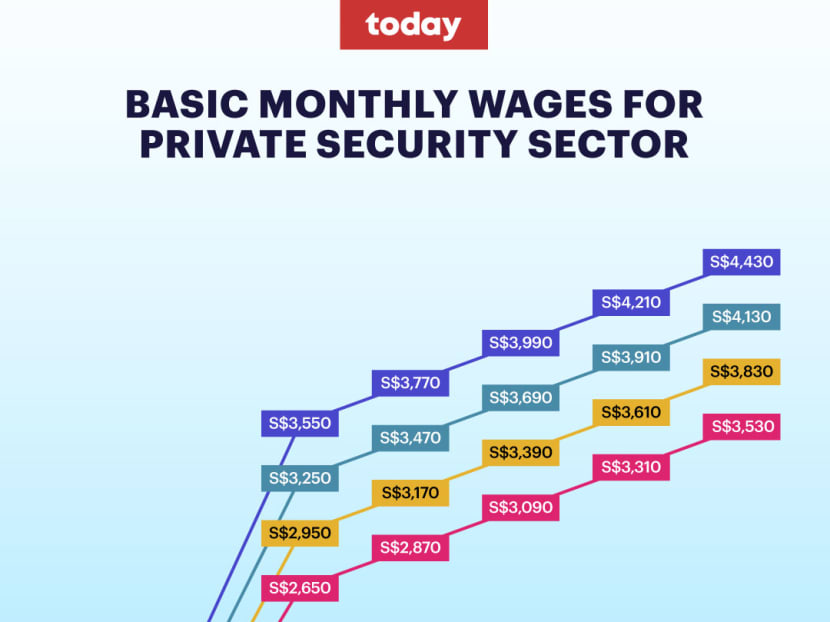Minimum salary for entry-level security officer to rise over 50% to S$3,530 by 2028
SINGAPORE — Monthly gross salaries of entry-level security officers are set to increase by more than 50 per cent by 2028 to a minimum of S$3,530, after the Government on Friday (Nov 12) accepted a proposal by a workgroup to progressively increase wages for the private security sector.

A latest wage review is aimed at benefiting some 40,000 resident security officers in employment and will mean that in about six years, the monthly gross wage of an entry-level security officer will come close to what a fresh graduate now earns.
- Monthly gross wage of security officers of various ranks will rise by 6.6 per cent a year on average from 2022 to 2028
- This comes after a review of the progressive wage model for the private security sector
- The latest review also seeks to reduce overtime hours by prompting security officers to negotiate better terms with their employers
SINGAPORE — Monthly gross salaries of entry-level security officers are set to increase by more than 50 per cent by 2028 to a minimum of S$3,530, after the Government on Friday (Nov 12) accepted a proposal by a workgroup to progressively increase wages for the private security sector.
The recommendations come amid calls to improve working conditions and reduce excessive overtime hours in the industry.
The workgroup said they also hope the increased wages will help encourage society to place a higher value on work performed by front-line security officers, an issue brought to the fore due to the Covid-19 pandemic.
Overall, the monthly gross wage across all job levels of the sector will rise at an average compound annual rate of 6.6 per cent from 2022 to 2028 for Singaporean and permanent resident workers.
The salary review comes under the progressive wage model, which sets out minimum pay requirements for workers at different skill levels and mandates wage increases in tandem with the workers’ training and skills.
It is aimed at benefiting some 40,000 resident security officers in employment and will mean that in about six years, the monthly gross wage of an entry-level security officer will come close to what a fresh graduate currently earns.
The monthly gross salary is estimated based on a basic pay and 72 overtime hours, but the minimum wage is set regardless of the amount of extra hours a security officer puts in.
Mr Zainal Sapari, the assistant director-general of the National Trades Union Congress (NTUC) and chairman of the workgroup, said he hopes that the move to raise salaries in this sector could help curb overwork and attract younger Singaporeans to the field, which is now plagued by long working hours, an ageing workforce and low productivity.
The security industry has long faced a manpower crunch and security officers are often asked to work overtime.
“We want to see a future where our security officers can take full advantage of technologies, become more productive in their jobs and earn more while having more time to rest and progress in their careers,” Mr Zainal said.
The latest recommendations were announced by the Security Tripartite Cluster, a workgroup comprising representatives from the Government, employers and the labour movement.
WAGE INCREASE
The progressive wage model for the security sector was first launched by the workgroup in 2014. Since 2016, private security agencies have had to adopt the wage model as part of their licensing conditions.
In 2017, the workgroup recommended an annual salary increase of at least 3 per cent from 2022 to 2024, which it had said was subject to review.
This 3 per cent increase will remain next year before the new set of recommended increments are implemented, which will lead to a jump of between 9.5 per cent and 14.4 per cent in 2023.
From 2024 to 2028, the minimum pay for security officers of all ranks will then rise by S$220 every year.
This means that the gross salary for the lowest-rank security officer will go up from the current minimum of S$2,193 to S$3,530 in 2028.
For a senior security officer, the gross salary will be raised from S$3,109 to S$4,430 over the same period.
The aim is to have the overall wage growth of security officers outpace the median resident worker, the workgroup said.
The workgroup also recommended that the Government provide transitional wage support to employers in the industry, to help them cope with the cost of the pay increases.
Mr Amos Kng, chief executive officer of security firm Security and Risk Solutions, told TODAY on Friday that he supports the recommendations and believes that they will benefit security officers.
Security and Risk Solutions employs about 900 security officers and mainly deals with corporate multinational clients and government agencies.
Mr Kng, who was not part of the workgroup, said that some security firms, especially those working with local clients such as condominiums or malls, might face difficulties renegotiating contract rates though.
“Many local buyers are trying to contain costs, leading to some (security) service vendors having to cut corners. And ultimately, the guy on the ground gets the blunt end.”
Mr Kng added that some firms working for these buyers would need wage support from the Government to pay higher wages.

CURB EXCESSIVE WORKING HOURS
From 2024, the baseline salaries set under the progressive wage model will take into account overtime pay for extra hours put in beyond the regular 44-hour work week. The model now sets baseline wages based on security officers’ basic salary, not counting overtime pay.
The workgroup said that this is an added safeguard to make sure security officers are not asked to work beyond the maximum cap of 72 hours of overtime a month set out under the Employment Act.
Mr Raj Joshua Thomas, president of the Security Association Singapore, said that the move to regulate gross rather than basic wages means that security officers will be paid at least the mandated amount regardless of the extra hours put in.
“What we want to create, or foster an environment of, is security officers negotiating with security agencies and ultimately trickling upwards, where security agencies will negotiate with security buyers to say, ‘Look, in order for me to staff the headcount that you need, we need to look at more favourable working hours’.”
In order to bring down working hours, the workgroup is hoping to encourage more security firms to raise their productivity through skills upgrading and adopting technology.
Mr Zainal said that the workgroup expects about a three- to five-year timeframe from 2024 to cope and learn to redeploy manpower before security officers’ working hours start to go down.
Mr Steve Tan, executive secretary of the Union of Security Employees, appealed to security buyers to structure their contracts based on the outcomes they require.
Instead of merely specifying a certain number of security officers needed, buyers should consider reviewing their tender specifications to define their desired outcomes based on a security risk assessment that can judge security agencies, the workgroup urged.
“While we focus on the critical wage points, we must not neglect that… this (proposal) allows us an opportunity to transform the way manpower is bought,” Mr Tan said.
“If we continue, before and after 2024, to say that I want three day guards, three night guards and I want them to work 12-hour shifts, then we would have made zero progress.”











